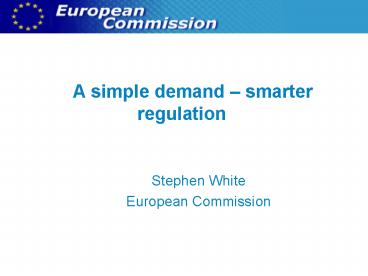A simple demand - PowerPoint PPT Presentation
1 / 21
Title: A simple demand
1
A simple demand smarter regulation
- Stephen White
- European Commission
2
Smart regulation
Improving legislation at all stages of the
policy cycle
3
Smart Regulation
8 October 2010, COM(2010) 543
- is about the whole policy cycle
- must remain a shared responsibility of
- the European institutions and of Member States
- is about strengthening the voice of
- citizens and other stakeholders
4
Looking forward Impact Assessment
5
The Rationale behind Impact Assessment
- Make better proposals
- Changed two-thirds of our proposals, often
significantly - Promote coherence consider social, economic and
environmental impacts - Transparent and open decision making
- Show consideration given to a proposal
6
Common sense questions
- Was right procedure followed incl stakeholder
consultation? - What is the problem? ? Evaluation as input
- What are the objectives?
- What policy options exist?
- What are the impacts and trade-offs?
- Future monitoring and evaluation?
7
What is Impact Assessment?
- Not a substitute for political judgement!
- One system, applied to all Commission proposals
- 600 or so available on the web
- Never fully quantified
- Takes time and money to do properly
8
The final product
- Commission Staff Working Paper so only translate
Executive Summary (no more than 30 pages)
9
Impact Assessment Board
- Launched by President Baroso on 14 November 2006
- Independent body to ensure good quality of
the Commission impact assessments - No escape examines them all
- Resubmission rate of around 40
- Stops a proposal going ahead until passed
- Quality bar increasing over time
10
Outside the Commission
- The Inter Institutional Agreement
- European Parliament and Council will assess the
impact of substantial amendments (eg Batteries
amendment) - The three institutions agreed common approach to
impact assessment - Member States
- For many, analysis is not systematic or
transparent
11
What makes it work
- Quality check
- Commitment (not voluntary turkeys dont vote
for Christmas) - Start early
- External scrutiny
- Integrated (economic, environmental, social)
- Support and advice throughout
- Resource-intensive, but the best way to get a
good process and product and to influence
decisions - Good evidence base as to what has worked and what
the problems are
12
Looking back Evaluation
13
Evaluation a political priority
14
Reinforcing the use of evaluation
- Evaluation, what and why ?
- Evaluation is the main tool used by the
Commission to assess the extent to which EU - interventions reach the set policy objectives
and how their performance can be - improved in the future. Well-conducted
evaluations can help improving the relevance,
- effectiveness and cost- effectiveness of public
interventions and evaluation can - increase the transparency and accountability
concerning EU expenditure. - Communication SEC(2007)213 of 21.2.2007.
Responding to Strategic Needs - Reinforcing the use of evaluation
15
Evaluation to support new initiatives
- New significant initiatives should be based on an
evaluation of the policy framework in place - Evaluation should be covered extensively in the
roadmaps - Flag all relevant evaluative material in support
of your initiative - Evaluation aspects are an important factor in
SG-DG bilateral meetings - Evaluation forms the basis for the Impact
Assessment (IA) - IAs have a section on future evaluation
arrangements
16
Evaluation in figures 2010
Number of ex-post evaluations finalised?
113
Percentage of outsourced evaluations?
80
200 000 euro
Average cost of an external evaluation ?
19 million euro
Total cost for all external evaluations?
Average duration for a retrospective evaluation?
14 months
Total number of evaluations completed so far
over 1300!
17
Fitness checks pilots
- Employment and social affairs
- Information and consultation of workers
- Enterprise
- Agro-food industry
- Environment
- Protection of EU freshwater resources
- Transport
- Internal market for aviation
Delivery 2012
18
Complementary approach
Fitness checks of entire policy sectors
19
What makes it work
- A demand exists
- Moving from programmes to policies
- A good evidence base from the Member States
20
Not just Commission internally
- Promoting assessment
- Environmental Impact Assessment Directive
- Strategic Environmental Assessment Directive
- Aarhus Directive
- Within policies, for example
- Socio-economic analysis in REACH
- River Basin Management Plans
- Environmental Liability Directive assess damage
21
Key links
- Evaluation on Europa http//ec.europa.eu/dgs/secr
etariat_general/evaluation/index_en.htm - Better regulation http//ec.europa.eu/governance/
better_regulation/index_en.htm - Impact Assessment on Europa
- http//ec.europa.eu/governance/impact/index_en.ht
m - Smart Regulation Communication
- http//ec.europa.eu/governance/better_regulation/
documents/com_2010_0543_en.pdf































